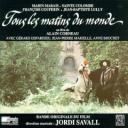 After Sunday’s posting about my non-viewing of the Academy Awards (and judging by the low-ratings scorecard, I had plenty of company!), once I got to the concert I realized/remembered three more factoids that made the whole music – movies link with Jian Wang even more even more apropos:
After Sunday’s posting about my non-viewing of the Academy Awards (and judging by the low-ratings scorecard, I had plenty of company!), once I got to the concert I realized/remembered three more factoids that made the whole music – movies link with Jian Wang even more even more apropos:
*It could be argured that Jian owes his entire career to the silver screen. It was a film, after all, that introduced the West to Jain Wang — as a ten-year old budding cellist who appears while the credits roll at the tail-end of the 1981 Isaac Stern documentary From Mao to Mozart. Continuing the previous theme, an Oscar winner, natch. (You can see the YouTube Video of the last 10 mins or so of the movie either by clicking on Jian’s picture above or here). And what happened after that? This from an interview Wang gave to Strings magazine:
Sau-Wing Lam, a music enthusiast who had left China in 1948 and built up a large and prosperous business in the U.S., saw From Mao to Mozart and was fascinated by the young cellist. Through the director of the Shanghai Conservatory, an old schoolmate, he made inquiries about the boy and learned of his exceptional promise. Lam then wrote to China’s Minister of Culture, proposing to help Wang further his studies in America……
*So when Jian Wang (pronounced “zhan WHONG”) eventually made to America, his Juilliard classmates gave him an American nickname: “John Wayne.”
*And as Wang racks up glowing reviews for his interpretations of the Bach Cello Suites, (and I considered it a real treat to hear him play these life in a room before an audience of about 100 people), he credits…(wait for it)……a terrific French film about the life of Baroque composer Marin Marais and his teacher Saint Colombe for changing his approach to playing Baroque music in general, and Bach in particular.
In the beginning I tried to play the [cello] suites like songs, to make them pretty. But by my mid-20s, they became about more than just being beautiful – also about what we hope to be in this world but can’t. At least for me, it was a view into another spiritual world. After that, I started liking the way I played them better, and then I noticed that other people did too.
I would say one of the triggers was the movie Tous les Matins du Monde. The scene that touched me greatly was when Saint Colombe sits down and begins playing, thinking about his wife who had just died. The simplicity of the music, the organic feeling of it, brought tears to my eyes. From then on, I listened to a lot of Baroque music. I find it very much like Chinese poetry. You know, some concertos are like novels, with fascinating, fantastic stories. You get an entirely different feeling when you read a 20-character poem in Chinese. In those four lines, with five characters per line, you have a mini-universe, so dense and yet so simple. It makes you feel that the world is much more logical.
Click here to read the entire interview with Jian Wang, who’s playing the Bach cello suites tonight at the new Harman Center in Downtown DC.
And here for more on the great soundtrack recorded by Jordi Savall that sparked the worldwide Marin Marais craze. Okay, that’s a stretch. But I do remember the haunting Bells of St. Genevieve got a fair amount of airplay after the move came out in ’92….

Be First to Comment